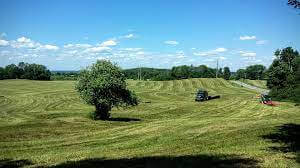Food and Beverage > Organic
A long long time ago, Russ and Beth bought a farm in the busy little town of Boonville. Though Russ had a business going, he always knew the farm would become part and parcel of everyday life. In 1996 hay was being produced on the farm and sold to brokers. In 2003 a truck was purchased and they started trucking their hay to New England. More equipment was added, additional land was leased and more hay was baled and sold. In 2004 some maple syrup was attempted with so-so results. By this time, the former business was all but folded up and put away so we focused on the farm - making even more hay. We needed to diversify. In 2009, 88 gallons of maple syrup was made with some better success. A couple of years later a couple of Angus cows showed up so we rented the neighbors’ barn and pasture. As you know, cows are like dogs and cats, but instead of puppies and kittens, you end up with calves. Calves grow up into more cows than you can chase when they get out!
Then we tried to grow and fine-tune our operation. One of the attempts was to be organically certified. I guess that's working for those making milk and vegetables but the organic corn and organic hay for cows just didn’t pan out. As it turns out, our farm location doesn’t provide the degree-days necessary for high corn and soybean yields; and organic hay just doesn’t command a marginal benefit to cover the cost and hassle of being certified. So then we tried a drying tunnel for making premium quality, early cut hay. Great idea, but VERY expensive to produce really nice early cut hay. Sure, there was lots of interest in it, but we just couldn’t justify the additional cost and lower margin.
Perhaps it was the long winter hours and drinking coffee or the picking up hay bales into the wee hours of the morning (yes, we saw the sun coming up more than a few times while picking up hay bales) that got us mulling over the efficiency and productivity of our hay operation. So we smashed the piggy bank and bought a large square baler. But one big problem remained - hay we couldn’t sell. Everybody that makes hay has some that isn’t stored right or just doesn’t cure right and, well, just can’t or shouldn’t be sold. That's when the cows started to look like a herd. Then we got onto ‘baleage’. That is what’s in those gargantuan marshmallows at the edge of the field. It’s grass that has been baled up at 45 to 60 percent moisture and allowed to ferment anaerobically -- boy, you should see them cows eat that baleage!!! That’s what makes the great tasting marbled beef.
Now, let's talk about those 88 gallons of syrup. As it turns out, with maple sap at around 1.5% sugar (which is what we get on this farm), you need about 57 gallons of sap to make a gallon of syrup. That translates into well over 5000 gallons of sap or well over a thousand trips up the hill with a mostly full 5 gallon pail of sap. When you get to the top of the hill, there's only about three and half gallons left in the pail. So, like any intelligent person, we decided to carry two pails. I’m sure the judges would still give us high marks due to the difficulty of carrying 80 pounds of sap through 4 feet of snow on snowshoes in bone-chilling temperatures (wet sticky clothing not-with-standing) up Mount Crumpet, the steepest side even the Grinch would avoid -- testimony to the benefits of child labor. Augment all this with processing and storage ignorance, we ended up with some that, well, didn’t look as good as it did when it was bottled. Of course, you never know this until you uncap it. Our apologies and appreciation goes to our friends who opened up a jug and discovered less than perfection and never complained.
The bees, oh, the honey bees. I’m still befuddled why thousands of bees in a 3 hive body hive full of capped honey for winter food would abscond the hive on Thanksgiving. Dumb, just dumb. At one time we had, I’m guessing, 15 or so hives. We went into our last season with eight or ten hives and by January, all had left or died out. I know of no other business where the essence of your production capacity dies or leaves. They are truly more frustrating than cows. I refer you to the last sentence of the first paragraph. All the bee equipment was put up over the barn for LONG term storage.
So after buying a bunch of trucks, tractors, other equipment and building hay sheds, fences, and sap pipelines, Wrisley Brothers Farms (named after the three sons, Seaver, Tyler and Connor) is ‘turning the corner’. We have three current products: grass hay, Angus beef and maple syrup. The hay is sold directly to the horse, cow, alpaca, sheep and goat market. We typically only sell our own hay and don’t buy any because of quality issues. The beef is grass fed and finished on grass for a high quality, healthy beef product. I have only found this flavor and texture in high-end steakhouses in Puerto Rico and Brazil. The maple syrup, well, we went and studied Pete’s maple syrup operation and quickly figured out what we could do to improve. Our syrup is a lot better, and now, the most common comment we hear is, "Wow, That's good stuff!"
To sum it up, sure, we made some mistakes and are probably still making some. We’ve tried to improve and the Lord knows we invest. We jokingly call this the ‘Black Hole Farm’. This leads us to the old jokes: there’s money in farming, we put it there, or, you can make a little money in farming, just start with a lot of it. We shudder at the thought of winning the lottery or money at the casino; we could win another farm. Or our favorite: when the farmer was asked about his lottery winnings, he replied, “I’ll just keep farming ‘til it’s all gone". So, aside from the long hours of fixing equipment, haggling over the price of a bale of hay, trying to figure a way to market premium beef, or figuring how to build a maple sap reverse osmosis system, I’d have to say we’ve come a long way. No one can diminish the value of a hand shake, smile, or hug from customers that have become dear friends. At the end of the day, there are no office politics, no back stabbing, no going to bed angry. It’s all about a bale of hay, a great steak, or a bottle of delicious maple syrup. We work hard, play hard, and sleep well. If I was asked if I made the right decision to farm, the answer is “absolutely”. Given the opportunity, I’d do it all over again -- without a doubt.

Details
- Last Updated
- 16/Oct/2024
- Contact
- Russ Wrisley
- [email protected]
- Phone
- (315) 942-2504
- Website
- http://www.wrisleybrothersfarms.com/
- Address
- 8473 Sudal Hill RdBoonville, NY 13309
